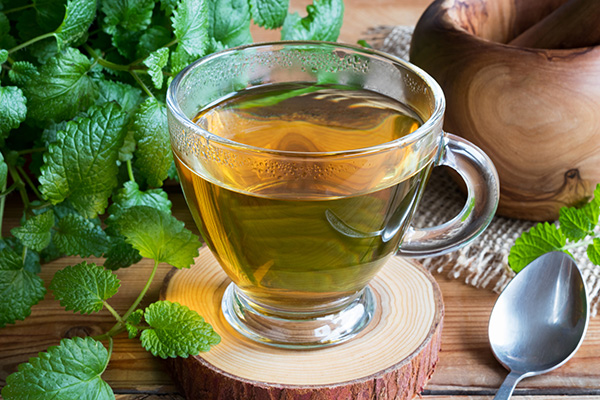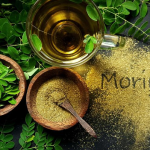Lemon Balm Tea Benefits
Lemon Balm Tea Benefits: Lemon balm (Melissa officinalis), a member of the mint family, is renowned for its calming properties.
Historically, this herb has been valued since the Middle Ages for its ability to alleviate stress and anxiety, promote restful sleep, enhance appetite, and relieve digestive discomfort, including symptoms like gas, bloating, and colic.
Even prior to the Middle Ages, lemon balm was infused in wine to elevate mood, aid wound healing, and treat bites and stings from venomous insects.
In contemporary herbal practices, lemon balm is frequently blended with other soothing herbs, such as valerian, chamomile, and hops, to create calming teas and tinctures. Additionally, lemon balm is incorporated into topical creams to address cold sores (oral herpes), showcasing its versatility.
Plant Description
Lemon balm is native to Europe but is cultivated worldwide. Beyond its role in herb gardens and as a bee attractor, it is also grown for medicinal purposes, cosmetics, and even furniture polish production.
The plant can grow up to 2 feet tall, and if left unchecked, it may reach even greater heights. During the spring and summer months, clusters of delicate light yellow flowers bloom where the leaves meet the stem, adding to its aesthetic appeal.
The leaves of lemon balm are notably deeply wrinkled and vary in color from dark green to yellowish-green, depending on environmental factors such as soil type and climate conditions.
When rubbed, the leaves release a tart and sweet aroma reminiscent of lemons, making them easily identifiable. The shape of the leaves closely resembles that of mint, highlighting their shared lineage within the mint family.
Medicinal Uses and Indications
Insomnia and Anxiety
Research indicates that lemon balm, particularly when combined with other calming herbs like valerian, hops, and chamomile, may effectively reduce anxiety and enhance sleep quality. While limited studies have explored lemon balm’s effects in isolation, those that have generally focus on topical applications.
One notable study found that 81% of participants who took a herbal blend containing valerian and lemon balm reported significant improvements in sleep compared to those who received a placebo. However, the specific contribution of lemon balm versus valerian remains unclear.
Similar results have been observed in studies addressing anxiety, which typically utilize combinations of various herbs to alleviate symptoms.
In a double-blind, placebo-controlled trial involving 18 healthy volunteers, participants received two separate doses of standardized lemon balm extract (300 mg and 600 mg) or a placebo over seven days.
The results revealed that the 600 mg dose of lemon balm significantly improved mood and enhanced feelings of calmness and alertness.
Herpes
There is promising evidence suggesting that topical ointments containing lemon balm may aid in the healing of cold sores caused by the herpes simplex virus (HSV). In a study involving 116 individuals with HSV, those who applied lemon balm cream to their lip sores experienced significant reductions in redness and swelling within just two days.
However, other symptoms such as pain and scabbing did not show marked improvement. Participants and their healthcare providers reported the lemon balm ointment to be highly effective.
Additionally, a large-scale study conducted across three German hospitals and one dermatology clinic found that lemon balm was effective in treating primary HSV infections, with no recorded recurrences.
The cream has also been shown to shorten the healing time for both genital and oral herpes lesions. Supporting these findings, several animal studies indicate the efficacy of topical lemon balm in managing herpes lesions.
Furthermore, preliminary research suggests that lemon balm may exhibit significant concentration-dependent activity against HIV infection, highlighting its potential antiviral properties.
Stress Relief
Lemon balm is renowned for its ability to alleviate stress, promoting relaxation and enhancing overall mood. A study conducted in 2004 revealed that lemon balm could effectively mitigate the adverse mood effects associated with psychological stress induced in a laboratory setting.
Participants who consumed lemon balm reported feeling a heightened sense of calmness and a decrease in alertness. Although this study employed a double-blind, placebo-controlled design, it featured a limited sample size of just 18 individuals. Therefore, further investigation is necessary to deepen our understanding of lemon balm’s effects on stress.
Recommended Usage: For stress relief, consider taking 300 milligrams (mg) of lemon balm in capsule form twice daily. During acute stress episodes, a single dose of 600 mg may be beneficial.
Anxiety Reduction
In addition to its stress-relieving properties, lemon balm may also be beneficial in alleviating anxiety symptoms, including feelings of nervousness and excitability. A 2014 study explored the impact of lemon balm-containing foods on mood and cognitive function.
Participants consumed a beverage and yogurt infused with lemon balm, either sweetened naturally or artificially. Those in both groups reported noticeable improvements in mood, particularly a reduction in anxiety levels.
While these findings are promising, further studies are required to establish the effectiveness of lemon balm for anxiety management.
Recommended Usage: For reducing anxiety, a dosage of 300 to 600 mg of lemon balm three times a day is suggested. Higher doses may be taken during acute anxiety episodes.
Cognitive Function Enhancement
The same 2014 study also investigated lemon balm’s potential to enhance cognitive performance. Participants completed various computerized tasks that assessed memory, mathematics, and concentration.
Results indicated that those who ingested lemon balm performed better than those who did not. While there was a noted increase in alertness and overall performance, it is essential to note that fatigue can develop over time.
Additionally, the method of consumption, particularly combining lemon balm with food, may influence its absorption and effectiveness. More extensive research is warranted to further elucidate these findings.
Recommended Usage: For cognitive function enhancement, it is advisable to take 300 to 600 mg of lemon balm three times daily.
Sleep Disorder Relief
When combined with valerian, lemon balm may offer relief from insomnia and other sleep-related issues. A study conducted in 2006 highlighted that children who received a combined treatment of lemon balm and valerian experienced a 70 to 80 percent improvement in sleep-related symptoms.
Both researchers and parents considered lemon balm to be an effective treatment option. However, additional research is necessary to confirm these positive outcomes.
Recommended Usage: To help ease insomnia, consider brewing a cup of tea with valerian and lemon balm before bedtime. You can find both loose-leaf and bagged varieties at local grocery stores or online.
Cold Sore Treatment
Lemon balm may also be effective in treating cold sores when applied topically at the first sign of an outbreak. In a 1999 study, participants used either a lemon balm cream or a placebo cream on the affected area four times a day for five days.
The findings indicated that those using the lemon balm cream experienced a reduction in symptoms and healed more quickly than those who did not.
Furthermore, researchers suggested that the application of lemon balm cream might help extend the intervals between cold sore flare-ups.
However, additional research is needed to validate these observations.
Recommended Usage: To treat cold sores, apply lemon balm cream to the affected area several times a day. Before use, conduct a patch test by applying a small amount of cream to the inside of your forearm. If no irritation or inflammation occurs within 24 hours, it is likely safe for use.
Indigestion Relief
For those suffering from frequent abdominal discomfort, lemon balm might offer relief for digestive issues. A small study conducted in 2010 examined the effects of a cold dessert infused with lemon balm on functional dyspepsia.
Participants consumed either a sorbet with or without the herb following a meal. While both types of desserts alleviated symptoms, the lemon balm-infused sorbet provided a more pronounced improvement. More extensive research is needed to fully understand these effects.
Recommended Usage: To enhance digestion, add 1 teaspoon (tsp) of lemon balm powder to a bowl of ice cream or blend it into a smoothie for a refreshing treat.
Nausea Relief
Due to its potential benefits for digestive health, lemon balm may also be helpful in alleviating feelings of nausea. A 2005 review of multiple studies highlighted lemon balm’s effectiveness in treating gastrointestinal symptoms, including nausea.
Although the findings are promising, it is important to note the limitations of the studies, many of which involved lemon balm in combination with other herbs. Further research is necessary to determine the effectiveness of lemon balm when used on its own.
Recommended Usage: For nausea relief, brew and drink a cup of lemon balm tea at the first sign of discomfort. Loose-leaf or bagged options are available at local grocery stores or online.
Menstrual Cramp Relief
Research suggests that lemon balm may also be beneficial in alleviating menstrual cramps and symptoms associated with premenstrual syndrome (PMS).
A 2015 study investigated the impact of lemon balm on reducing cramp intensity among 100 high school girls. Over three consecutive menstrual cycles, participants received either lemon balm essence or a placebo.
Those taking the lemon balm reported a significant decrease in PMS symptoms. However, further research is required to corroborate these findings.
Recommended Usage: For optimal results in managing menstrual cramps and PMS, consider taking 1200 mg of lemon balm daily. This dosage allows the herb to build up in your system before symptoms arise, with continued use potentially leading to reduced symptoms over time.
Headache Pain Relief
Lemon balm may prove beneficial in alleviating headache pain, particularly when headaches are induced by stress. Its calming properties can help promote relaxation, alleviate tension, and soothe tight muscles.
Additionally, it is believed that consuming lemon balm can assist in opening up and relaxing constricted blood vessels, which may contribute to headache discomfort.
Recommended Usage: If you frequently experience headaches, consider taking 300 to 600 mg of lemon balm up to three times daily. This approach allows the herb to build up in your system before a headache manifests. During the onset of a headache, you may take a higher dose for increased relief.
Toothache Pain Relief
Thanks to its analgesic properties, lemon balm may also serve as an effective remedy for toothache pain. In addition to its relaxing effects, this herbal remedy is thought to target inflammation within the body, which can further help alleviate discomfort.
However, more research is required to fully validate these claims.
Recommended Usage: For toothache relief, use a cotton swab to apply diluted lemon balm oil directly to the affected area as needed. Ensure that you choose an oil that has already been diluted with a carrier oil, such as jojoba oil.
If you opt for pure lemon balm oil, it is crucial to dilute it before application, as essential oils should not be used directly on the skin without proper dilution.
Other Uses
Emerging evidence suggests that lemon balm, particularly in combination with other herbs, may be beneficial in treating indigestion. Additionally, studies indicate that lemon balm oil possesses significant antibacterial activity.
For instance, one study demonstrated that lemon balm effectively inhibited the growth of Listeria monocytogenes and Staphylococcus aureus. Furthermore, a few studies have explored lemon balm’s potential to enhance cognitive function and reduce agitation in individuals with Alzheimer’s disease.
What Is It Made Of?
Lemon balm supplements are derived from the leaves of the plant. The essential oils extracted from these leaves contain plant compounds known as terpenes, which are believed to contribute to the herb’s relaxing and antiviral properties.
Lemon balm is rich in tannins, which may play a role in its antiviral effects. Additionally, it contains eugenol, a compound that can soothe muscle spasms, numb tissues, and exhibit antibacterial properties.
Available Forms
Lemon balm is available in various forms, including dried leaves sold in bulk, teas, capsules, extracts, tinctures, and oils. While some creams containing high concentrations of lemon balm are commonly found in Europe, they may not be available in the United States.
However, lemon balm tea can be applied topically using cotton balls. The herb is also found in homeopathic remedies and can be utilized in aromatherapy as an essential oil.
How to Take It
Pediatric Use:
Lemon balm may be used topically in children to treat cold sores. It’s essential to consult a healthcare provider to determine the appropriate dosage based on the child’s age.
Adult Use:
For individuals seeking relief from insomnia, indigestion, flatulence, or bloating, it’s advisable to consult a knowledgeable provider to identify the specific dosage that best suits your needs. Possible dosages may include:
- Capsules: Take 300 to 500 mg of dried lemon balm, three times daily or as needed.
- Tea: Steep 1.5 to 4.5 grams (approximately 1/4 to 1 teaspoon) of dried lemon balm in hot water. This can be consumed up to four times daily.
- Tincture: Take 60 drops of lemon balm daily.
- Topical Use: Apply a lemon balm cream to the affected area three times daily or as directed.
For treating cold sores or herpes sores, steep 2 to 4 teaspoons of crushed lemon balm leaves in 1 cup of boiling water for 10 to 15 minutes. Once cooled, apply the tea to the sores using cotton balls throughout the day.
Precautions
While the use of herbs has a long history of supporting health and treating various ailments, it is crucial to recognize that herbs can contain compounds that may cause side effects or interact with other herbs, supplements, or medications. Therefore, it is advisable to use herbs under the guidance of a healthcare provider experienced in botanical medicine.
Pregnant and breastfeeding women should avoid using lemon balm, as its effects during these periods have not been adequately studied.
Possible Interactions
Lemon balm may interact with several medications, including:
- Sedatives and Thyroid Medications: Lemon balm has the potential to interact with sedatives prescribed for insomnia or anxiety, as well as with medications used to regulate thyroid function. If you are currently taking any of these medications, it’s important to consult your doctor before incorporating lemon balm into your routine.
- HIV Medications: The interaction between lemon balm and antiretroviral agents remains unclear. Therefore, if you are on medication for HIV, it is advisable to avoid using lemon balm until more information is available regarding its safety and efficacy in this context.
Benefits of Eating Pomegranate
Foods to help with Constipation

A graduate of Computer Science and Information Management Technology. Diploma – Caregiving, Certificates – Dementia and Diabetes Awareness and Management. A researcher, blogger, songwriter, singer and acoustic guitarist. Born in an environment where natural talents such as healing are imparted at our natural birth. This natural talents of healing is the result of our genetic inheritance and the training from family environment.













